Overview
The Oxford MSc in Taxation is a two-year part-time postgraduate degree offered by the Oxford University Faculty of Law, and is taught in association with the Oxford University Centre for Business Taxation based at Saïd Business School.
If you wish to study individual electives rather than the full degree, please look under 'Non-degree students' for more information.
Unusual among Masters in Taxation degrees, the MSc in Taxation has been designed by a combination of lawyers and economists. The degree is taught by lawyers and economists from the Faculty of Law and the Centre for Business Taxation, as well as a select group of practising lawyers and other leading academics. This combination ensures that students not only acquire a detailed understanding of technical law, but also the ability to think deeply about the underlying policy considerations. An element of interdisciplinarity runs through the whole degree and, in addition, the in-built flexibility of the course allows students to tailor their studies to their individual preferences.
This flexibility is particularly important because the MSc in Taxation has been designed as a part-time degree to appeal to a range of students from a variety of disciplinary backgrounds. The degree aims to accommodate both those who are engaged in full-time careers and those who are taking a break but have other duties and responsibilities.
These unique features of the MSc in Taxation make it the ideal degree for practitioners in law and accounting firms who wish to move from a technical to a deeper understanding of taxation: insights that will help propel their career forward. This approach also makes this the degree of choice for those working in revenue authorities and treasury departments, as well as for those contemplating an academic career in taxation. Teaching is planned so that the many skills-sets and knowledge bases represented in the class are accommodated and developed to enhance class discussion.
The increased focus on taxation by politicians and the media, as well as the ever-increasing technical demands of the subject and the pace of change at an international level, means that there has never been a more important time to study taxation from a range of perspectives.

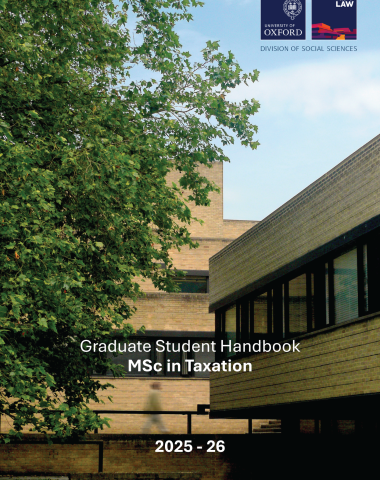
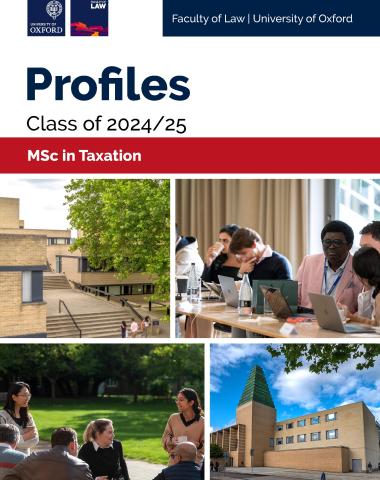
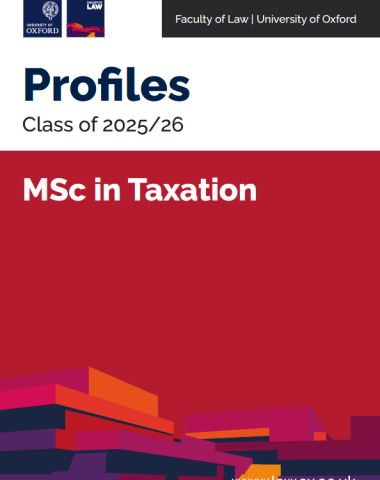
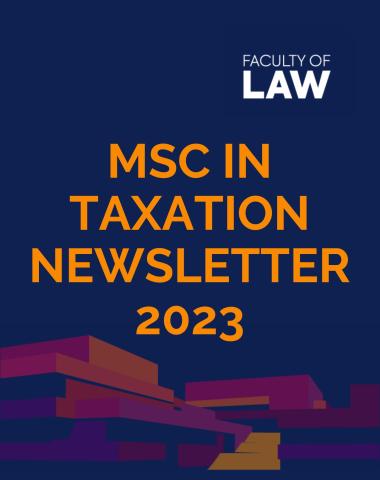
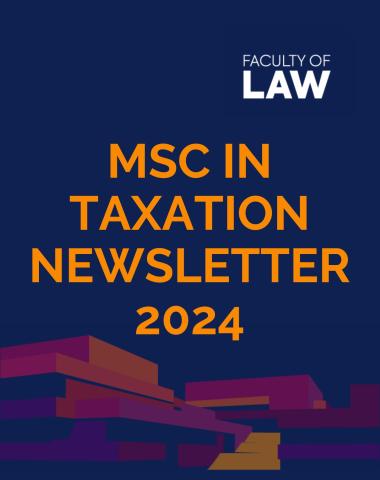
Course in brief
Contact Details
All enquiries relating to the MSc in Taxation should be directed to the MSc in Taxation Office
Key Elements
- The MSc in Taxation is open to both lawyers and non-lawyers, and can be tailored to meet different interests
- Students take nine courses over two years - three compulsory core courses and six elective courses. The norm is for students to take five courses in Year 1. With permission they may take four courses in Year 1 and five in Year 2
- A 12,000 word dissertation in lieu of two elective courses is also available
- Teaching is mainly in lectures and interactive classes, and is structured to enable students to fit their studies around work and other commitments
- A virtual learning environment provides students with access to course materials and research resources, and enables them to remain in contact with teachers and other students during periods away from Oxford
- Attendance at all core courses and chosen electives is mandatory
Practical information
Official course overview, application deadlines and application procedures can be found on the main Oxford University website
Structure
Teaching is undertaken in Oxford in intensive periods, primarily during three residential weeks and at weekends, or in other short blocks of time. Care has been taken in designing the degree to ensure that, despite its part-time nature, students still enjoy the unique Oxford experience, including Oxford teaching methods, small class sizes, college life and interaction with Oxford faculty and students.
The MSc in Taxation is open to both lawyers and non-lawyers, and can be tailored to meet different interests. The degree is ideal for practitioners in law and accounting firms who wish to get a deeper understanding of taxation. It is also a great way to keep in touch during career breaks.
Students take nine courses over two years - three compulsory core courses and six elective courses. The norm is for students to take five courses in Year 1.
- Tax Principles and Policy
- Principles of International Taxation
- Tax Research Round Table
Electives are taught in Oxford as intensives, over two weekends or in other short blocks of time. Typically electives are assessed by way of two 3,000 word assignments.
The degree is not designed for distance learning but for people who will attend the courses in Oxford in person.
Core Courses
- Tax Principles and Policy, September Year 1, assessed by way of two 3,000 word assignments.
- Principles of International Taxation, January Year 1, assessed by way of two 3,000 word assignments.
Electives
Core Course
- Tax Research Round Table, September Year 2, assessed by way of one 6,000 word assignment.
Electives
Electives on offer in 2025–26 are as follows:
- EU Tax
- Problems in Transfer Pricing and PE Profit Attribution
- Rereading Classic Texts
- Tax & Development
- Tax & Human Rights
- Tax & Public Policy
- Tax Treaties
- Taxation of Corporate Finance
- UK Corporate Tax
- UK Taxation of Global Wealth
- VAT
Some electives are offered every other year, for a full list of electives offered by the MSc in Taxation, please click here.
Elective Courses 2025–26
The course EU Tax Law will enable students to develop an in-depth understanding of European Union (EU) tax law and policy in the global context. This course will provide a comprehensive overview of the key aspects necessary for understanding how EU law affects investors and other economically active persons and entities within the EU and from third countries; as well as demonstrating how the EU’s tax policies are influenced by and shape global tax developments.
The programme will include the study of:
- •The primary law of the European Union and the effects it has on Member States’ direct taxation through the fundamental freedoms. This part will focus on landmark cases and several case studies which illustrate the impact of EU law on national tax systems, including exit taxation and anti-avoidance cases. Both the examples of the application of the freedoms within the territory of the EU/EEA and in third-country scenarios will be addressed.
- The interaction between the international and European legal order in the tax context. The relationship between various types of legal instruments will be covered, including possible tensions between the Anti-Avoidance Directive and bilateral tax treaties and the application of the OECD’s Multilateral Convention to Implement Tax Treaty Related Measures to Prevent Base Erosion and Profit Shifting in the EU.
- EU fiscal state aid. This part will offer an overview of fundamental features of the EU fiscal state aid regime, its impact on tax rulings by EU Member States and an in-depth inquiry into the Apple case.
- The EU secondary legislation which facilitates cross-border capital flows (the Parent-Subsidiary Directive and the Interest and Royalties Directive), tackles abusive tax practices (the Anti-Avoidance Directive), stimulates administrative cooperation (the Directives on Administrative Cooperation in Tax Matters) and introduces an obligation on Member States to arrive at a resolution of all disputes that originate in bilateral tax treaties (Directive on Tax Dispute Resolution) will be discussed.
- Non-binding measures (the so-called “soft law”), including those aimed at tackling “harmful tax competition” and the promotion of good tax governance in third countries through the “black” and “grey” lists of non-cooperative jurisdictions.
- Current issues in EU tax law and ongoing policy work, including the proposed harmonisation of corporate tax base and the introduction of formulary apportionment (Directive on Common Consolidated Corporate Tax Base), and the initiative on the taxation of the digitalised economy.
The course is taught by Dr Anzhela Cédelle, OEDC and others.
The Transfer Pricing course is concerned with the arm’s length principle and its application in the form of transfer pricing and profit attribution rules. The course provides an overview of transfer pricing and profit attribution from both a theoretical and practical perspective using case studies to illustrate the key principles, with a focus on the OECD Transfer Pricing Guidelines for Multinational Enterprises and Tax Administrations and the OECD’s guidance on PE attribution including the 2010 Report on the Attribution of Profits to Permanent Establishments. The course will consider the current debate on transfer pricing and profit attribution with a number of topical examples and the major conceptual, technical and practical problems of the income allocation rules will also be an especial area of focus.
The course includes the following topics:
- Fundamental Sources
- The Arm’s Length Principle and Comparability
- Functional Analysis
- Transfer Pricing Methods
- Comparability analyses in practice
- Intra-group services
- Risk and capital
- Issues raised by minimal function entities
- Financing
- Intangible property
- Business restructurings
- Permanent Establishments
- Compliance issues
- Avoiding Double Taxation/Dispute Resolution
- The future of the income allocation rules/arm’s length principle
The course is taught by Dr Richard Collier, Associate Fellow at Saïd Business School and Professor John Vella.
The Rereading Classic Texts in Tax Law & Policy course will explore issues of topical importance in the field of taxation. The content will vary from year-to-year, and the course will be taught primarily by visiting lecturers, with contributions from Oxford-based academics.
Tax law is at a crossroads. Dramatic changes over the past years on the national, regional, and global levels have yielded substantial challenges for tax law and policy. These changes have brought to the forefront big questions on the normative and practical levels, domestically and internationally. Classic dilemmas of increasing welfare versus (re)distributing it have intensified, while new dilemmas of membership in democratic societies, tax competition, and international cooperation have emerged.
In this course we will go back to some of the most influential articles, books, reports and cases on various aspects of tax law and policy (e.g., what is income, tax and inequality, tax expenditures, taxing women, competition v. cooperation and global justice). We will read these classics with a critical eye, evaluate their contributions, confront them with their critics, and examine their relevance to contemporary times and the issues currently at stake.
The course will employ a variety of normative considerations – justice, efficiency, personhood and democratic participation – and will engage with methods and concepts that often inform other areas of law as well as other disciplines, but no prior knowledge of any of the above is required.
The course will be taught by Professor Tsilly Dagan with guest lecturers Linda Sugin, Fordham Law School, Reuven Avi-Yoanh, University of Michigan School of Law and others.
The Tax and Development course will explore the role of taxation in the governance and economies of emerging and developing countries. We will discuss the role of taxes in state building and explain how tax systems of emerging and developing countries evolved over time. We will explore the challenges such countries face in pursuing the classic goals of taxation, namely justice and efficiency, and consider the impact of increasing globalization and tax competition on the ability of LDCs to promote those goals. We look at the interaction of states’ tax policies with the policies of other (developed as well as emerging and developing) countries in bilateral tax treaties and consider the dynamics of such treaty negotiations. Finally, we will consider the impact of current multilateral initiatives for global reform of the taxation of multinational enterprises, of previous recent reforms such as the OECD/G20 Base Erosion and Profit Shifting project, and of evolving international cooperation—on tax systems in developing countries. We will conclude by taking an in-depth look at Sub-Saharan countries, using these countries as a summary case study.
The course will be led by Professor Tsilly Dagan and Professor Vicki Perry (Georgetown University) with guest speakers from various developing countries.
The Tax and Human Rights course examines tax issues from a human rights perspective. The course is divided into two. In the first – and main – part, the course examines in depth the issues relating to the provision of adequate protection for taxpayers as a balance to the powers given to revenue authorities in different countries. The focus is on EU/Council of Europe countries. The protections under Community law and the European Convention on Human Rights (ECHR) will be examined in detail, but much of the analysis will be relevant to other countries too. In the second part, the course will examine a new and growing literature which argues for an increased role for human rights in setting tax policy and in combating abusive tax practices, particularly by large businesses in the context of corporate social responsibility programmes and codes as well as in relation to regulation.
The course is taught by Visiting Professor Philip Baker KC, Professor John Vella and Professor Judith Freedman.
The Tax and Public Policy course provides students with the essential tools to assess tax policy, with a particular emphasis on economic analysis. After discussing where economic analysis fits in the complete toolbox for assessing tax policy, students will be taught the essential tools from economic analysis in some detail. Having equipped students with these tools, the course then guides them through some fundamental issues in tax policy design. A number of cases studies are using during the course.
This is an elective course. Issues of tax policy will be considered in other compulsory and elective courses on the MSc. However, this course will cover these various issues in tax policy in a coherent and more detailed manner and with a greater emphasis on economic analysis.
The course includes the following topics:
• Tax Design and the Complete Toolbox
• Economic Tools and /Concepts (including efficiency and optimal tax theory)
• Some Fundamental Tax Policy Choices (including tax base, taxation of capital, rents)
• Corporation Tax Policy
The course is taught by Professor Michael Devereux, Professor John Vella and Professor Neils Johannesen.
The Tax Treaties course focuses on the operation of double taxation conventions (more colloquially referred to as “tax treaties” and often abbreviated as “DTCs”). The emphasis is on the interpretation and application of DTCs, though students will also learn something about the negotiation of DTCs.
The course includes the following topics:
- Introduction to the structure and operation of the principal model DTCs – the OECD Model Tax Convention (“MTC”) and the UN MTC
- General provisions and definitions – especially the definitions of “resident” and “permanent establishment”
- Business profits – Arts. 7 and 9 OECD MTC
- Passive income – Arts. 10, 11, and 12 OECD MTC
- Individuals – Arts. 15, 16, 17 and 18 OECD MTC
- Methods of relief from double taxation – Art. 23 OECD MTC
- Non-discrimination – Art. 24 OECD MTC
- Settlement of international fiscal disputes – mutual agreement procedure – Art. 25 OECD MTC
- The future role of DTCs
First year students are strongly encouraged to attend Tax Treaties, as it is a foundation for many of the other electives.
The course is taught by Visiting Professor Philip Baker KC.
The Taxation of Corporate Finance course focuses on the tax treatment of debt, equity and derivative contracts, but also includes other financing structures such as repo transactions and equity finance. The aim of the course is to provide practical knowledge and insights into the general approaches that can be taken in the taxation of these instruments. Significant attention is given to the principles of corporate finance taxation and their impact on financing and investment decisions. The course aims to alert students to some of the most important policy debates surrounding the decision to tax corporate capital and the use of taxation as a means of regulating corporate behaviours. In particular, students will learn about the tax treatment of: income earned through holding securities and lending money; capital raised by issuing securities and borrowing money; and the impact of tax-driven arbitrage relating to financing structures, including in a domestic and cross-border context. Students will also acquire the ability to identify the tax implications of the most common corporate financing decisions and those corporate investment decisions that relate to shares and other financial instruments. Though some of the discussion will be illustrated by reference to the UK tax system, there is no requirement that those attending the course need to have any detailed understanding of the UK tax rules (and nor is this a goal of the course). The rules in other tax systems will also be used to illustrate the discussion in appropriate cases.
The course is taught by Dr Richard Collier, Associate Fellow at Saïd Business School and Professor John Vella.
The UK Corporate Tax course aims to introduce students to the issues surrounding taxation of domestic and multi-national corporations under UK law. Although the focus is on UK taxation, many of the issues discussed will raise fundamental issues around taxing corporations and these will be explored at a general level also.
The course covers corporation tax theory, UK corporate tax structure, distributions and loan relationships, integration with personal taxation, the calculation of corporate profits and gains for tax purposes, losses, treatment of small business, treatment of groups, mergers and acquisitions and international aspects of UK corporation tax as well as examining the relationship between UK corporates and the UK revenue authority under the co-operative compliance regime. The course is complemented by another option, Comparative Corporate Tax, which will approach the subject through the comparison of taxation in a number of jurisdictions but study of the subject in the context of a single jurisdiction will provide a greater depth of knowledge which home students will find can readily be applied in various professional situations.
The course is taught by Professor Glen Loutzenhiser, Jonathan Peacock KC, 11 New Square, and Dominic Foulkes, Davis Polk.
The UK Taxation of Global Wealth course examines UK tax and related issues from the perspective of wealthy families and individuals who are either resident in the UK (even if temporarily) or hold assets situated here. Capital is far more international, diverse in nature and mobile than in the early 20th Century. Gone are the landed estates situated in one country on which estate duty was easily imposed. Taxing global wealth effectively and fairly presents particular challenges for governments, demonstrated by the fact that there is very little consistency in approach even within Europe. Common reporting and greater tax transparency of offshore vehicles as well as increasing capital inequality has heightened the public debate on how wealth should be taxed.
The overall aim of this course is to look at how wealth is currently taxed in the UK and consider whether there are better alternatives. The focus is on UK tax and particularly tax design, including consideration of connecting factors to the UK justifying UK taxation, and the wider economic implications and arguments for the taxation (or non-taxation) of the wealthy and of capital. As wealth is typically held through trusts, foundations and similar vehicles, we consider how these should be taxed in an ideal world and whether current solutions used by the UK and other countries are sound from the tax and economic perspectives. Although the focus is on the UK tax system, we will also consider at a high level the approach to taxing wealth taken in other jurisdictions. We also examine equitable remedies such as rescission in the context of tax disputes.
The course is taught by Emma Chamberlain, Barrister, Pump Court Tax Chambers and Visiting Professor, Oxford Faculty of Law, Simon Douglas, Associate Professor of Law, Oxford Faculty of Law and Arun Advani, Assistant Professor in the Economics Department at the University of Warwick.
VAT raises a lot of revenue for the UK government. It is the UK’s main consumption tax and the theory behind it might even be described as elegant. However, the problems on the ground caused by an uncertain tax base, varying rates and the failure to adopt either a universal destination or origin basis, contribute to the problems that the tax causes for HMRC and the taxpayer alike. At the European level, this course explores direct effect, procedural aspects, principles and avoidance. From a UK perspective, the Value Added Tax course considers the nature of supplies (including exempt and zero-rated supplies), consideration and who constitutes a taxable persons.
The course is taught by Professor Rita de la Feria, University of Leeds, Professor Edoardo Traversa, UCLouvain, and Professor Joachim Englisch, University of Münster.
Student Experience
Students on the Oxford MSc in Taxation will be members of one of the participating Oxford colleges. Long term accommodation in college is not provided as this is a part-time degree. However, some colleges may be able to let out guest rooms for some of the electives. Arrangements are made for the three mandatory courses.
Students will find that college membership enriches their time at Oxford, offering the chance to interact with faculty and students from diverse academic backgrouds in situations varying from high table dinners to college balls. Students will be able to attend a wide range of conferences and guest lectures at the Faculty of Law and Centre for Business Taxation, and have access to University facilities, including the Bodleian Law Library - one of the largest and most important open-access law libraries in Europe. Students also have distance access to an extensive range of online databases, including Westlaw, LexisNexis, IBFD, OECD and Tax Analysts.
I am currently Head of Tax at one of the largest equities hedge fund managers in Europe. Having specialised in tax for the past 12 years as a tax advisor in one of the big four accounting firms and presently in the hedge fund industry; I have been looking to pursue graduate study to further enhance my knowledge of tax, thus was excited to hear of the launch of the part-time MSc in Taxation by the world-renowned Faculty of Law at the University of Oxford
The programme is ideal because of its part-time format. As I do not have to take two years off from work, I would be able to immediately put into practice the knowledge acquired while staying close to my young family
Admissions
The Chartered Institute of Taxation (CIOT)
The Chartered Institute of Taxation (CIOT) has recognised the University of Oxford MSc in Taxation as a qualification which gives an entitlement to Confirmation of Eligibility to register as a student for the CTA exams. For further details of the CTA exams please see the Chartered Institute of Taxation website.
In cases meeting the criteria specified by the CIOT, students electing to write an extended dissertation may be able to submit that dissertation separately, once they have completed their degree, for a CTA Direct Fellowship. Interested applicants are encouraged to contact the Education Team at CIOT on 020 7340 0550 or the Education Team email address.
Non-Degree & Australian Students
We are offering a limited number of places on the MSc in Taxation elective courses to a select group of non-degree students interested in attending the lectures but not able/willing to pursue the full degree.
There is an information sheet with further details, including how to apply, for non-degree students and one for students from Australian Universities. Alumni of the Oxford part-time MSc in Taxation will receive a 50% discount.
We have agreements with the following institutions to accept a small number of their students on the individual electives:
- Melbourne Law School, the University of Melbourne (students on the Masters of Laws (LLM), Master of Tax or Master in International Tax)
- The University of Sydney (students on the Master of Laws (LLM) or the Master of Tax (MTax))
- The University of New South Wales (students on the Master of Taxation (MTax) or the Master of Laws (LLM))
Scholarships and Prizes
There are a small number of scholarships available specifically for MSc in Taxation students. In addition, prizes are available for the best performance in each course and elective.
- James Bullock Scholarship: £5,000 over the two years
- Field Court Tax Chambers Scholarship: three awards for one year (number of awards and amount varies each year)
- One Full-fees needs based financial assistance award for 1st year students
Find out more about all scholarships from the Faculty of Law.
Field Court Tax Chambers prize for best overall performance in the MSc in Taxation
Gray's Inn Tax Chambers prize in Tax Principles and Policy
Best performance by a non-degree student
A Law Faculty prize in all other courses
Careers and Internships
The MSc in Taxation course administrators and the Careers Service can provide you with support in your career planning and management. As an Oxford Alumnus, you can attend careers events, fairs, workshops and company presentations. Your student account on CareerConnect will switch to an alumni account when your University card expires, ensuring you stay up-to-date with job vacancies, events, skills sessions, fairs and resources on job sectors, applications and international opportunities. For more information visit the Careers website.
The Careers Service also provides information about a series of Professional networking events.
Governance
-
Professor Tsilly Dagan, Faculty of Law
-
Professor Michael Devereux, Centre for Business Taxation
-
Professor Glen Loutzenhiser, Faculty of Law
-
Professor John Vella, Faculty of Law and the Centre for Business Taxation
Course Administrator: Liz Gresham, Faculty of Law
Administrator for Alumni, Events and Teaching Support: Agata Dybisz, Faculty of Law
- Philip Baker KC, OBE, Field Court Tax Chambers, Course Co-founder and Visiting Professor, Faculty of Law
- Paul Brice, Departmental Lecturer
- Dr Anzhela Cédelle (née Yevgenyeva)
- Emma Chamberlain, Barrister, Pump Court Tax Chambers and Visiting Professor, Faculty of Law
- Simon Douglas, Associate Professor of Law, Faculty of Law
- Emeritus Professor Judith Freedman, Faculty of Law and Centre for Business Taxation
Oxford University has strong links with a world-wide network of leading academics and practitioners. Teachers participating in the teaching have included the following:
- Professor Reuven Avi-Yonah, University of Michigan
- Professor Jennifer Blouin, University of Pennsylvania
- Dr Meghan Campbell, University of Birmingham
- Dr Richard Collier, Associate Fellow at Saïd Business School
- Professor Rita de la Feria, Leeds University
- Professor David Duff, University of British Columbia
- Professor Joachim Englisch, University of Münster
- Domonic Foulkes, Davis Polk
- Malcom Gammie KC, One Essex Court
- Hans Gribnau, Tilburg University
- Dr Irem Guceri, Research Fellow at the Oxford University Centre for Business Taxation
- Professor Peter Harris, University of Cambridge
- Dr Martin Hearson, London School of Economics and Political Science
- Professor Neils Johannesen, University of Copenhagen
- Professor Susan Morse, The University of Texas
- Jonathan Peacock KC, 11 New Square
- Victoria Perry, Georgetown University
- Alice Pirlot, Assistant Professor, Geneva Graduate Institute
- Philip Ridgway, Barrister, Temple Tax Chambers
- Michael Ridsdale, Tax Partner, Wedlake Bell LLP
- Stephen E Shay, Senior Tax Fellow, Boston College Law School
- Professor Linda Sugin, Fordham University
- Professor Edoardo Traversa, UCLouvain
- Jeff VanderWolk, OECD Centre for Tax Policy and Administration
- Professor Richard Vann, University of Sydney
- Dr Adam Zalasiński, European Commission
Leading academics and practitioners are involved in the governance of the MSc in Taxation, including:
- Philip Baker KC, OBE, Field Court Tax Chambers, Course Co-founder and Visiting Professor, Faculty of Law
- Emeritus Professor Judith Freedman, Faculty of Law and Centre for Business Taxation
- Richard Collier, Associate Fellow at Saïd Business School, formerly a Tax Partner at PwC
- Bill Dodwell, Tax writer and policy adviser at the Office of Tax Simplification, formerly Head of Tax Policy at Deloitte
- Ekow Eghan, South Africa Leader, Ernst and Young
- Liesl Fichardt, Partner, Quinn Emanuel Urquhart & Sullivan LLP
- Giorgia Maffini, PricewaterhouseCoopers



